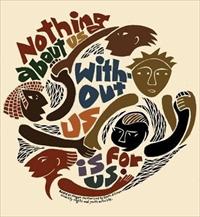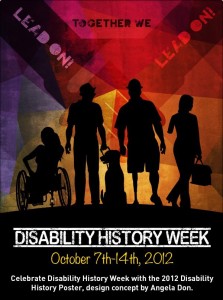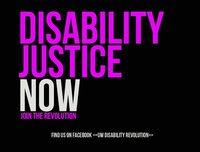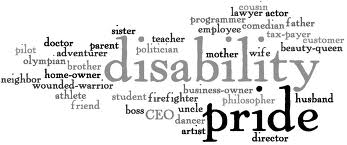A Word about Disability Terminology
As commenters on this blog, you are welcome to use whatever disability terminology you wish: disabled person, person with disabilities, differently abled, special needs, and so on. I prefer identity-first language (disabled person), but terminology is a matter of personal choice, and I follow a policy of non-interference in other people’s choices.
I don’t mind discussions about the relative merits of different terminologies, but they have to be in the proper context. On this blog, the proper context would be a post that focuses on terminology issues. In that context, everyone is welcome to weigh in. In any other context, I would consider raising the issue a derailment from the focus of the discussion.
No matter what the context, no one is welcome to advise, cajole, or pressure anyone else to use a different kind of terminology, and no one is welcome to tell people they’re doing it wrong. Please respect the ways in which other people wish to be addressed. So, for example, it’s out of line to respond to I’d prefer to be called a disabled person with You’ll always be a person first to me!
Seriously. Don’t do that.
Further, if a person has made a very clear request to be called by one term, and someone else insists on using another term to address that particular person, it is fine for the first person to restate the preference and ask that the other person abide by it.
The reason for all of this is simple: We are all fighting a hard battle. If the terminology that people have chosen helps them to move through the world feeling empowered and beautiful, I want people to feel that their choices are supported.
Not every use of a particular term needs to be an occasion for weighing in on your feelings about it. Please show respect for the choices of others, even if you disagree with them.
Thank you.
© 2013 by Rachel Cohen-Rottenberg









julesinrose
9/5/2013 | 8:47 pm Permalink
I’d really love to understand why this is such a problem. I’ve been criticized for calling MYSELF whatever I call myself by people who have no (visible) disabilities… I simply say “I’m disabled.” Does that mean I don’t think I’m a person? Nope. Most of the people who have pointed that out to me don’t treat me as if I am one, however.
Sarah
9/6/2013 | 6:39 am Permalink
I’m so glad you wrote this. I am a strong supporter of calling people what they prefer to be called, but I often feel intimidated when I don’t know what the preferred terminology in a particular microcommunity might be. It is terribly offputting for someone who is already a supporter to be sidelined for something that is not the focus of the main issue, so how bad must it be for people who are maybe ready to open up to understanding this way of thinking when they see an argument like that?
Not sure if I made sense, but thanks. I appreciate it.
naomi Mitchum
1/8/2014 | 9:34 am Permalink
Your preference for identity-first language should read, “person with a disability” that is the identity of the person first if you are writing for the public. For yourself, suit yourself, and stick to it, but in the 25 years I’ve been disabled, I’ve learned that it really is not important to ME.
The latest government term is “functional disability,” but it hasn’t caught on elsewhere.
Rachel Cohen-Rottenberg
1/8/2014 | 11:21 am Permalink
Naomi, you are incorrect. “Person with a disability” is person-first language, since the word “person” is first. “Disabled person” is identity-first language, because disability is the social identity connoted by the term; we are disabled by inaccessible environments. A lot of us prefer identity-first, and that’s what I use in my writing here. If I’m putting together a piece for a site that requires person-first language, or if I know that a particular audience prefers it, I’ll use it, but on my own blog, I use the language I am most comfortable with.
Aimee
3/9/2014 | 5:23 am Permalink
I’m personally not into terminology…
All thought; I do think and believe that, I am a person first. Than the word that society or majority have labeled me as… There for requiring something different like; exceptionality, functionality, visible, invisible disables are that just words to show how hard it is for one person or group of people to do something….
I cannot read… But I can see…
I cannot write… But you can read this…
I cannot understand… But I hear the words…
I can walk… But I don’t know where to go
I can fight but know what for…